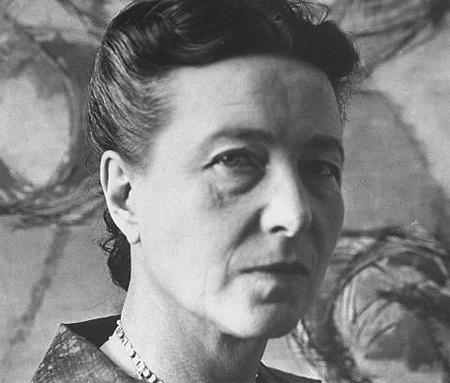Conflicts within feminism remain

Feminism today faces serious challenges, and defining exactly what it means to be feminist in the 21st century is an increasingly difficult task. By Shane Creevy.
Recent high-profile cases of domestic violence among celebrities – Chris Brown and Charlie Sheen spring to mind – lead to broad questions about the world around us. We might begin by thinking about the influence of American celebrities on Irish teenagers. We might also question the role of feminism in the twenty first century.
Do teenage boys still watch Two and a Half Men in admiration of their hero Sheen? Do young girls still listen to Brown’s records? What has been the effect of these incidents among their fans?
(Picture: Simone de Beauvoir, prominent second-wave feminist)
Dr. Moynagh Sullivan, lecturer in English and popular culture studies in NUI Maynooth, told Politico that such trends are a concern: "Most of the time when thinking about this I come out with more questions and a sense of unease about the relationships between public behaviours of celebrities. In a sense they can quite often become celebrated for behaviours that are violent."
"I was thinking of Mike Tyson’s appearance in The Hangover", she continued, "and I was thinking, here’s a convicted rapist being portrayed as this quite affectionate and caricatured creature for whom any kind of danger or violence has been taken out. It raises interesting questions about the relationship between popular culture to very serious issues of domestic violence."
So are we living in the age of post-feminism, an anti-feminist world which caters for a strategic way of working with a market that vociferously and relentlessly presents women as subordinate?
Did second-wave feminism – incorporating political activism and opposition in the 1960s – alienate young women from feminism? Too often feminism is conflated or misrepresented as a binary opposition between female and male. But, indeed, the political activism of feminism in the 1960s, while necessary, perhaps became squalid by its own engagement with binary thinking. The misrepresentation of feminism as anti-male might be said to have originated there and, as such, has been damaging – and not only to the male uptake of feminist ideas.
As Dr. Sullivan contends: “There is a popular media conception that to address issues of sexual violence and domestic violence is to align yourself with a culture that will somehow or another alienate you and that can be very off-putting for young women and can prevent a possibility of having space from which to think about or critique these things”.
Of course, it must also be noted that second-wave feminism was forced into activism by the very nature of reluctant governments. It is because of their work that we now have rape crisis centres all across the country. But one of the pressing difficulties of the feminist movement is that women are not a homogenous group and therefore there are different kinds of freedoms that different groups wish to obtain.
For example, many white women, due to their increased involvement in the industrialised world during World War Two, struggled for the freedom to work while many black women, due to a history of slavery, struggled for the right not to work.
Considerations of feminism in the twenty first century should not become mired in simple generalisations or oppositions. There needs to be a pluralist discourse and a respect for different kinds of feminisms; across different classes, colours and religions. Within Islamic feminism, for example, there are all sorts of interesting debates taking place.
These conflicts of interest are what make feminism interesting and vibrant. The movement could rarely be described as stale or static. Indeed, feminism can also offer a sphere of resistance for men who feel ensnared by traditional stereotypes of macho manliness.
Today, however, there are worrying trends in popular culture of the sexualisation of young girls and the increasing naturalisation of violence. These issues need to be addressed, not just by the very valuable work of our rape crisis centres all across the country, but also by all of us in society.
And so we all must answer the question for ourselves, what does it mean to be a feminist in the 21st century?
